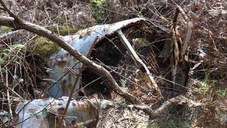
By Linda Gordon
WONTHAGGI’S heathlands are particularly lovely walking in spring, when the plants put on their best in the hope of attracting passing pollinators. I was disappointed last week, then, to see that someone had used the area near the start of a walking track as a dump site for a washing machine and a bed.
WONTHAGGI’S heathlands are particularly lovely walking in spring, when the plants put on their best in the hope of attracting passing pollinators. I was disappointed last week, then, to see that someone had used the area near the start of a walking track as a dump site for a washing machine and a bed.
Staff from the council and Parks Victoria had noted it, too. There was yellow and black tape around the dumped stuff.
What I can’t figure out is why anyone would drive down to the very end of an unmade road, on the outskirts of Wonthaggi, wrestle awkward, heavy things out of a trailer, push them part way into the bush, and then live with the guilt.
The tip is close, convenient, and charges nothing to dump white goods like washing machines, and very little for furniture. In fact, the wooden bed frame wasn’t damaged and could have been left at an op shop.
The council has used increased fines and hidden cameras at dumping hot spots in a more “proactive” approach to illegal dumping of late. Last year a counil officer told ABC local radio this approach had worked but that illegal dumping in the bush was not so much a waste problem as a human behaviour problem.
Well, good luck with that.
It’s an old and intractable problem. Humans leave their traces, their debris and castoffs wherever they go. Sometimes in wilder places, over a long time, it gets absorbed even transformed. This car, for example, which was dumped or driven into Wonthaggi’s mining landscape years and years ago, has been slowly consumed.
It is now where moss grows and bees live, where branches fall to rest and wagtails dart.
So, yes, the natural world can take and repurpose some of our junk but there’s a limit.
Under Bass Coast Shire Council's tip fees schedule, there is no charge for electronic waste such as televisions and computers, or white goods, which can be recycled.
What I can’t figure out is why anyone would drive down to the very end of an unmade road, on the outskirts of Wonthaggi, wrestle awkward, heavy things out of a trailer, push them part way into the bush, and then live with the guilt.
The tip is close, convenient, and charges nothing to dump white goods like washing machines, and very little for furniture. In fact, the wooden bed frame wasn’t damaged and could have been left at an op shop.
The council has used increased fines and hidden cameras at dumping hot spots in a more “proactive” approach to illegal dumping of late. Last year a counil officer told ABC local radio this approach had worked but that illegal dumping in the bush was not so much a waste problem as a human behaviour problem.
Well, good luck with that.
It’s an old and intractable problem. Humans leave their traces, their debris and castoffs wherever they go. Sometimes in wilder places, over a long time, it gets absorbed even transformed. This car, for example, which was dumped or driven into Wonthaggi’s mining landscape years and years ago, has been slowly consumed.
It is now where moss grows and bees live, where branches fall to rest and wagtails dart.
So, yes, the natural world can take and repurpose some of our junk but there’s a limit.
Under Bass Coast Shire Council's tip fees schedule, there is no charge for electronic waste such as televisions and computers, or white goods, which can be recycled.